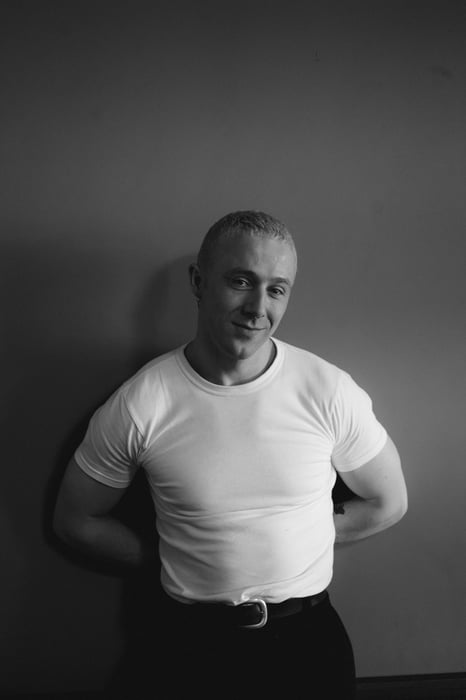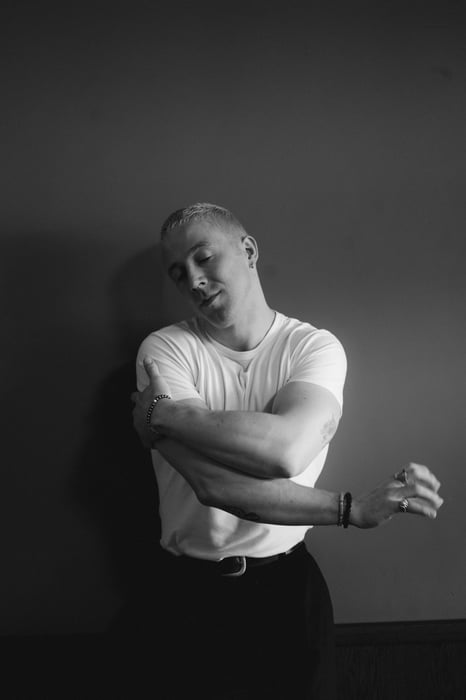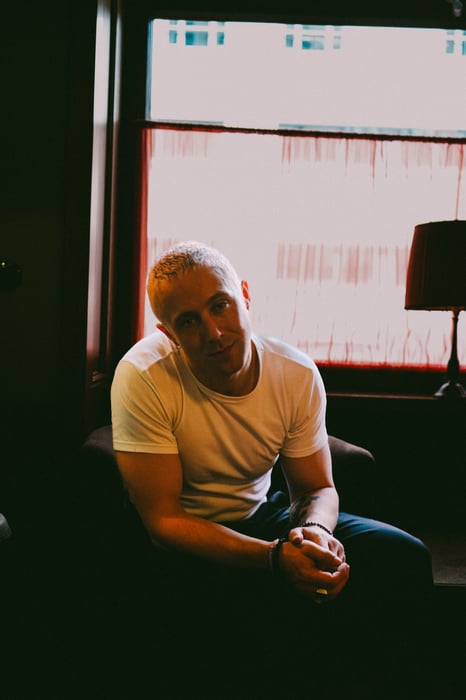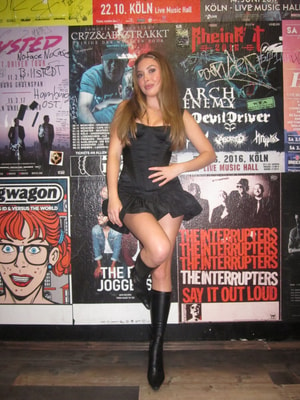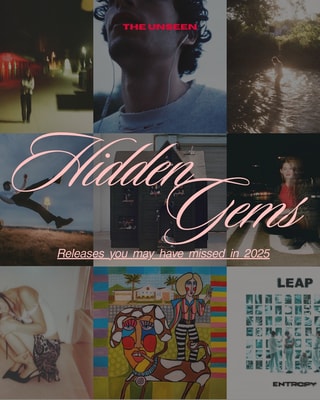Saying "Yes!" to Moncrieff
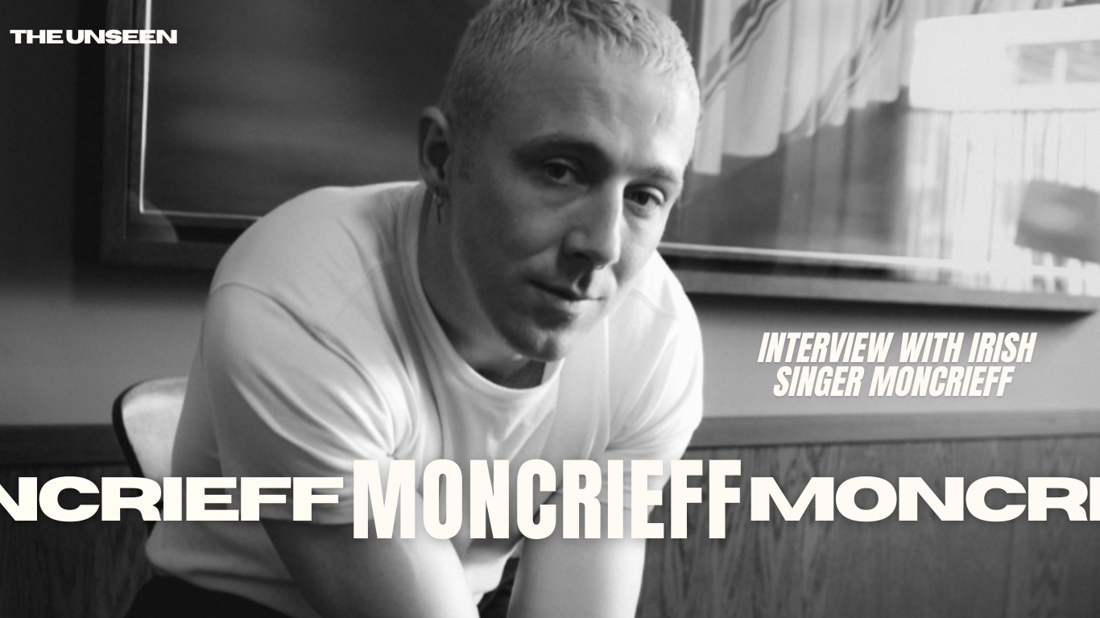
Moncrieff is an Irish singer-songwriter based in London who has released his debut album "Maybe It's Fine" on the 9th of May. Upon the release, we got the chance to meet up with him in Berlin to chat about his album, adulthood and his upcoming tour.
His sound varies from euphoric pop to heartfelt soul. Although he has just released his debut album, he's been making music for over 10 years now. The album documents his journey throughout his twenties. From the loss of his sibling, being in love for the first time, and the daily struggles every person in adulthood faces.
Frederike: Hi Moncrieff! First of all, thank you for meeting us so early in the morning.
Let's start with a little introduction about yourself or our readers who don't know you yet. Could you say three words that describe you the most?
Moncrieff: Okay. Honest, emotional and uhmm *laughs* I would say tapped, which is an Irish word for saying being a bit mental. Not in a bad way though!
Frederike: Hahah okay.
Your music is often described as a genre-mix, but how would you label your own music?
Moncrieff: I would say it's trying to tell the truth as much as I can to myself. And every song I write has to have an element of it. Even if it's really sad, it still has to have an element of hope in there, you know? Because I think that's where you find your hope, even in your darkest times, when you start confronting it, that's where you actually start to get out of it. I would describe my music as big, honest, emotional bops.
Frederike: Bops?! Would you describe your new album as a bop?
Moncrieff: Well, not really. I would describe it as an emotional ordeal.
Frederike: Why would you define it as an emotional ordeal?
Moncrieff: Well, I wanted this album to be like a journey of my twenties. You're like a million different people in your twenties, you know? You change all the time, and I feel like I wanted it to be an honest account of all the kinds of mistakes you make.
There are a lot of bops on the album, but there are a lot of quieter moments as well. And more intimate moments, because I wanted to show all the different personalities you kind of go through in your twenties.
Frederike: Speaking of being in your twenties, is there any advice you'd give someone in their twenties right now?
Moncrieff: Yeah, just live in the moment and say "yes!". Say yes to shit. If somebody wants to go out, say yes. If somebody wants to travel somewhere, say yes. If somebody wants help doing something, you get so much more out of saying yes, even if you're not sure, you know? So just say yes to stuff all the time.
Frederike: Honestly, that's really good advice. An older friend of mine told me the same thing when I started university and was afraid of not finding any friends. And it worked out pretty well haha.
You've always been a very present person in your music-making progress, meaning that you not only perform but you also songwrite and produce some of your songs. Could you rank them? Do you have a personal favorite on the album?
Moncrieff: Ohh, it changes all the time. I think artists go through periods of like "oh I love this song, oh I hate that song". But from the album, I really like Hard Feelings. I'm really happy with different aspects, like the music, the lyrics, and the production. When I'm making a song, I always try to think about how people are gonna listen to it in like 10 years. Is it gonna sound old or dated? But also from a personal touch, I really like Dashboard Confession and High For Free.
Making music = cooking pasta?
Frederike: And is there a track on the album that was the hardest to get right?
Moncrieff: I think it was Hard Feelings. That's why I think I'm so proud of that.
Frederike: What made it so hard to get it right?
*He shows us the demo of the song and then the released version*
Moncrieff: It sounds close to the finished version but there's so many decisions that went into it. There's like three different types of drums. There's two different basses playing the same thing. There's also a piano recorded in a weird way, but it sounds all very simple. Yet it was just a real pain in the ass to get right. That's why I'm so proud of it.
Frederike: But how do you figure out what you want to add or get rid of while being in the studio?
Moncrieff: Oh, it's tricky. It's kind of like cooking pasta. You've got your pasta, your salt, you're like oil, tomatoes. So I knew I wanted it to be a bit '80s sounding. A little bit like Prince with that sort of angsty falsettoey thing. And the piano to sound a bit '80s. That's all I knew when we started writing on the demo. Afterwards you go through a period where it's like "Cool, lets just throw everything at this song". Add another riff, get some synth in there and just keep throwing stuff in the pot and trying to take some things back. You can't think about it too much cause it'll never be perfect and just have fun with it.
Frederike: When you are in the studio and you are throwing the ingredients together and you need a step back. What do you do? Are going out for a walk, the pub?
Moncrieff: I think you definitely need to step back physically. Sometimes you need to step back and like not do anything else or move on to another song. Or yes, just like go for a walk, go get some food or even to the pub.
The Album - maybe it's fine.
Frederike: And going into the title of the album "maybe it's fine." Could you explain why you chose that title and what it means to you?
Moncrieff: Music to me is something that has literally kind of saved my life. I wanted to try find a phrase that is simple enough that everybody can say it and it can mean something to everybody in their own way. It'll make them think about their own lives or whatever's going on in their life. When I think about that phrase, I think about why I started music and the reason why I started. And the reason why I started was because I was lost, like as a 19-year-old kid after losing his brother the year before and his sister two years before that.
When everyone else around me was trying to figure out what college course they wanted to do and what stuff they wanted to do, I was trying to figure out how to kind of stay alive. And I found music and music was a path for me out of self-preservation. It offered me a way of explaining, processing and expressing things that were too big for any 19-year-old boy to talk about. So I moved to london and then became kind of the story for maybe it's fine.
Frederike: So the story of your twenties. What were they like?
Moncrieff: Well I started working minimum wage jobs in asian restaurants. I sat in record label offices and was told that my life was gonna change - and that fell through. I broke my own heart, broke someone else's heart. I had amazing experiences while trying to grieve and process a life without my two siblings. What I realized at the end of it when I wrote all these songs is that it couldn't have worked out any other way no matter what happened. Like everything just happened the way it happened and I didn't have control over it, no matter how often I thought I did. At the end of it, like maybe it's fine, maybe it's fine that it took all this time to get here. Maybe it's fine that that relationship didn't work out. Maybe it's fine that all these things played out the way they did. And I think if that's something that other people can relate to it's to give yourself a chance. Like you don't have control over the entire universe, you know? And you're, you're a perfectly flawed human being the way you are.
Frederike: And if you'd have to give a headline to your current phase of your life, what would it be?
Moncrieff: Oh god, it would probably be "grown up?".
Frederike: Do you feel like a full on adult now and properly grown up?
Moncrieff: I feel like a grown up. But am I? Like, am I done? Am I done with my shenanigans? I don't know. Because you're kind of entering that grown-up stage of your like where you are expected to be a little bit more mature. And a part of me does feel that way, but part of me also feels like I just wanna go on a three-day bender.
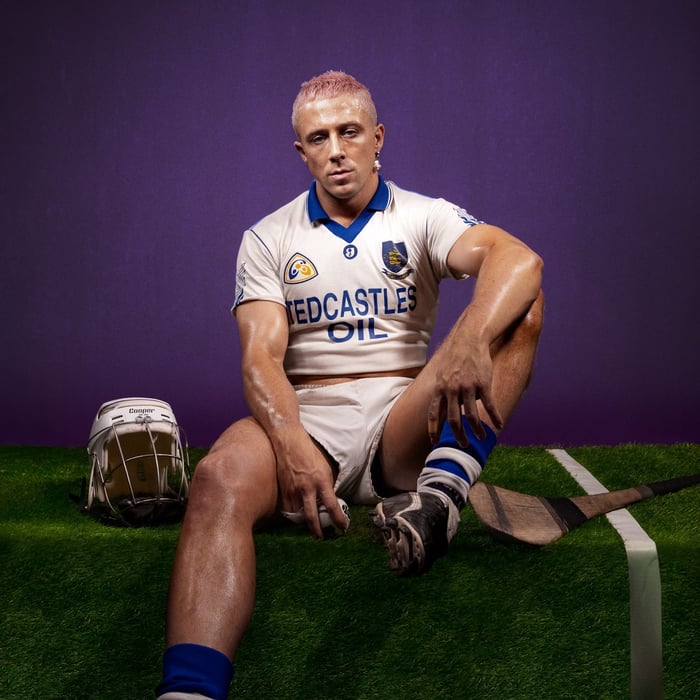
Irish roots and growing up
Frederike: So you've already told us that you've lived in London for a while now but you're originally from Ireland. How much of Ireland is still in your music?
Moncrieff: It's a really good question. Think there always is but not literally. But Irish music always revolves around storytelling, like folk music originates from Ireland. And I'm not saying what my music is folk, but it tells a story and there's always a narrative in, in what I do. And I think that's in, in my blood from being, uh, from being from Ireland.
Frederike: And which artists inspired you in your youth?
Moncrieff: Uhm, in my youth, maybe Maverick Sabre, who's an Irish artist. But I'd have to go with Macklemore *laughs*
Frederike: Oh really? How come?
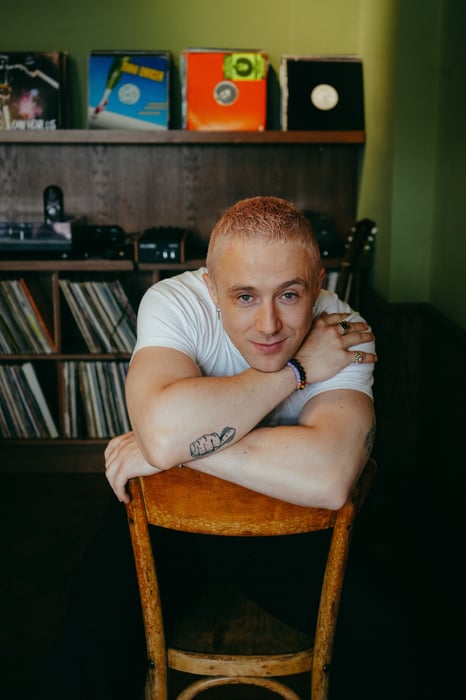
Moncrieff: I was in my first year in university, and I discovered Macklemore right around that time, and my brother had just passed away the year before, and I was, like, so lost. I discovered this guy's music, and for some reason, it just really resonated with me. And he's an independent artist and at the time, they were the first independent act to get to a Billboard number one since like the 1990s. They were coming to Ireland, and they'd already sold out, so I just wanted to send them an email explaining how much their music meant to me. I didn't want like anything free, I just wanted the opportunity to say thank you. And they didn't have an email address apart from their merch store, so I wrote them there. His partner sent me a message back saying, "Hey, they want you to come to the show." I went to this Macklemore show in Ireland and met the guy.
*brings out his phone mid-interview to scroll through his old Facebook to look for the picture*
Moncrieff: Here, that's me with Macklemore. So yeah, he had a big influence on me at that point in my life. I don't know why, but he just did.
Frederike: So whats your dream feature on a song? Macklemore?
Moncrieff: Uhm, no actually I've got bigger aspirations now. Unfortunately I've got a bigger ego. I'd love to do a song with Gracie Abrams. I'd also like to marry her but that's beside the point. *laughs*
Frederike: Haha, well I fear you're not the only one who wants to marry her.
Moncrieff: Yeah true, but I think she's still with Paul Mescal so she likes the irish thing, which is positive.
Frederike: Maybe you also need to start wearing short shorts.
Moncrieff: Yeah, gotta wear shorter shorts, that's the problem. *laughs*
Frederike: Well actually talking about fashion. You're wearing a Hurling Uniform, which is an irish sport, on your album cover. Why did you choose this specific outfit for the album cover?
Moncrieff: So the specific outfit is from my hometown. Every area in Ireland has their own hurling team and it's a huge sport in Ireland. For me, hurling was the biggest part of my life before I did music. I wanted to have a symbol of where I'm from, a symbol of my past, a symbol of who I am. Also a big part of my story was coming from this place in the southeast of Ireland where it's very like macho and I'm not a macho guy. I wanted to try make something that asked a question about masculinity as well. I wanted to crop this symbol of machoism and I wanted to crop it, make it look sexy . I had my nails painted, I wanted people to ask themselves, like, what is masculinity to a certain degree, you know? And they'll have a "maybe it's fine that he's wearing this jersey and looks sexy"- kind of thought.
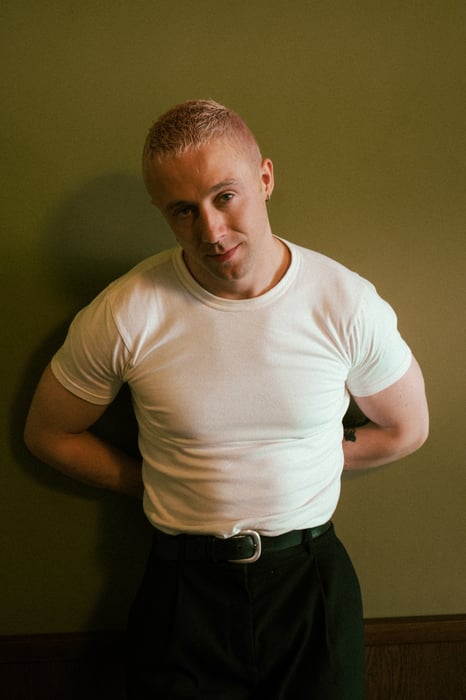
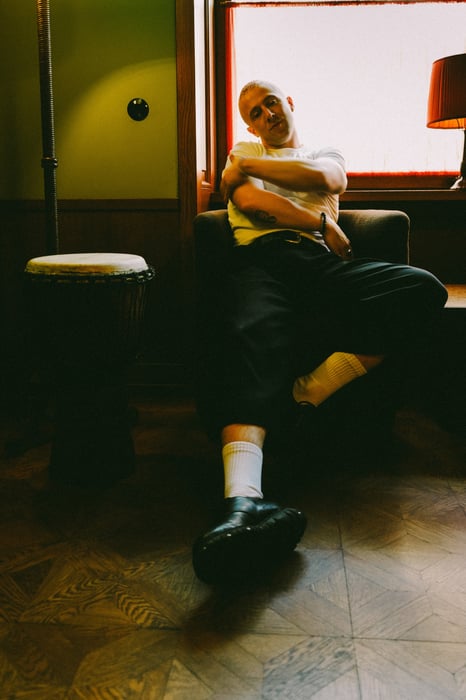
The maybe it's fine tour
Frederike: You are also going on tour this year. You've already performed the album a bit. How is it to finally perform in front of an audience after working so long on the album?
Moncrieff: It's crazy, because the album's only out for a couple of days, and I did like a couple of small pop-up shows, and there's people that know the lyrics to some of these songs already. And I'm like, "I don't know the lyrics to some of these songs." *laughs*
And, um, it is super special to see how people connect with it even so early.
Frederike: With your UK/EU Tour in autumn what can fans expect from the tour?
Moncrieff: Uhm, high emotions, sex, drugs & rock'n'roll. Haha no, actually. I wanna create a space where people can just like be the most true version of themselves, and like connect with whatever they're going through, be it happiness, be it whatever's happening in their life and just sing. That's always been my dream, just like create an experience that we're all experiencing the same thing, but our own individual version of it. Yeah.
Frederike: And I feel like every tour has a fan favorite song. What do you think is going to be the fan favorite song of the upcoming tour?
Moncrieff: I wanna say Dashboard Confession. Just because people are used to my music being very big sounding with dramatic arrangements and huge vocals. I want to put this on in there because it's the opposite of that. It's quiet and delicate but the emotions are still just as big. It's gonna be interesting to see like how people react to it.
Frederike: We will see if you are going to be correct.
We also have an artist recommendation playlist for the Unseen Magazine. Is there some song's you'd like to put in our playlist? Can be anything you want.
Moncrieff: Oh how fun. I mean summer is around the corner so a current favorite is Alive! by Bakar. Would also like to add Sexy to Someone by Clairo because that's a good summer bop. And lastly maybe Favourite by Fontaines D.C.
Frederike: Ah really strong selection! Thank you for taking the time to talk to us! It's been great getting to know you more and talking about your music!
Listen to his favorites on here:
Want to see more of Moncrieff? Here are all the photos of the Interview:
INTERVIEW BY
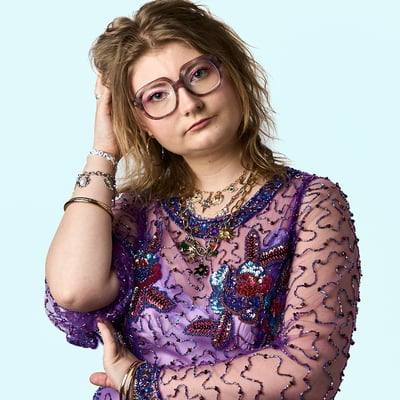
Frederike
Pop culture is my passion, and concerts are my second home. At Unseen Magazine, I dive deep into underground scenes, uncover unheard voices and bring new artists into the spotlight. I aim to showcase Berlin's vibrant music scene and what the mainstream bubble hasn’t discovered (yet).
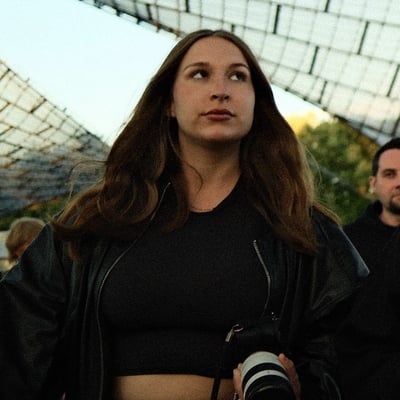
Lilly Marie
I am a music photographer with a passion for capturing raw emotions and storytelling through live performances and artist portraits. My work focuses on creating authentic and visually compelling moments that connect artists with their audience.
